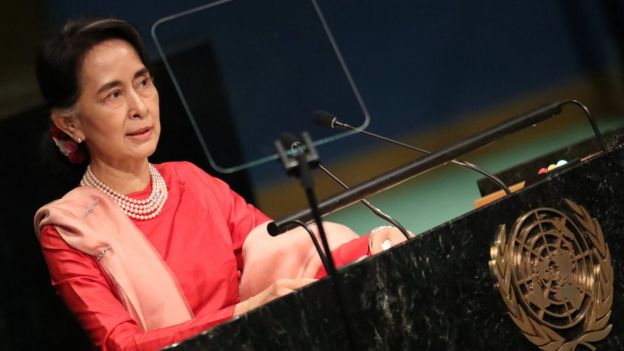Myanmar's de facto leader Aung San Suu Kyi is to miss a key UN debate next week as criticism grows of her handling of a crisis involving the Rohingya Muslim minority.
Some 379,000 Rohingyas have fled to Bangladesh since violence began last month. Whole villages have burned down.
The UN has accused the government of ethnic cleansing.
Myanmar's military says it is fighting Rohingya militants and denies reports that it is targeting civilians.
The Rohingya, a mostly Muslim minority in Buddhist-majority Rakhine, have long experienced persecution in Myanmar, which says they are illegal immigrants. They have lived in Myanmar, also known as Burma, for generations but are denied citizenship.
The UN Security Council is due to meet on Wednesday to discuss the crisis.
The organisation's refugee agency says not enough aid is getting through to the Rohingya who have fled to Bangladesh.
On visiting a camp, the UNHCR's George William Okoth-Obbo said there needed to be a massive increase in help.
Has Aung San Suu Kyi changed her mind?
Ms Suu Kyi had been expected to participate in discussions at the General Assembly session in New York, which runs from 19 to 25 September.
A government spokesman, Aung Shin, told Reuters news agency that "perhaps" Ms Suu Kyi has "more pressing matters to deal with", adding: "She's never afraid of facing criticism or confronting problems."
- Why won't Aung San Suu Kyi act?
- Who will help Myanmar's Rohingya?
- What sparked latest violence in Rakhine?
Another spokesman said Ms Suu Kyi would instead address the nation on TV on 19 September and "speak for national reconciliation and peace".
In her first address to the General Assembly as national leader in September last year, the former opposition icon defended her government's efforts to resolve the crisis over the treatment of the Rohingya.
The Nobel Peace Prize winner, who lived under house arrest for 15 years for her pro-democracy activism, is widely seen as the head of government in Myanmar.
Ms Suu Kyi has been criticised by former supporters in the West for failing to do enough to prevent the violence in Rakhine state.
Last week she said that the crisis was being distorted by a "huge iceberg of misinformation".
Fellow Nobel laureates, including the Dalai Lama, Archbishop Desmond Tutu and Malala Yousafzai, have called on Ms Suu Kyi to stop the violence.
What is happening in Rakhine state?
The latest wave of Rohingya fleeing their homes began on 25 August, following attacks by Rohingya militants on police and military posts.
Those who have fled say Myanmar troops responded to the attacks with a brutal campaign of violence and village burnings aimed at driving them out.

